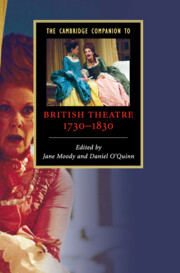Book contents
- Frontmatter
- Part I Performance
- Part II Genres
- Part III Identities
- 9 The making of an English audience: the case of the footmen’s gallery
- 10 Women playwrights
- 11 Entertaining women: the actress in eighteenth-century theatre and culture
- 12 Race and profit in English theatre
- Part IV Places of Performance
- Part V Further Reading
- Bibliography
- Index
- Series list
10 - Women playwrights
from Part III - Identities
Published online by Cambridge University Press: 28 May 2009
- Frontmatter
- Part I Performance
- Part II Genres
- Part III Identities
- 9 The making of an English audience: the case of the footmen’s gallery
- 10 Women playwrights
- 11 Entertaining women: the actress in eighteenth-century theatre and culture
- 12 Race and profit in English theatre
- Part IV Places of Performance
- Part V Further Reading
- Bibliography
- Index
- Series list
Summary
The story of female playwrights in the later eighteenth century begins with the eclipse of most of the women who preceded them. The Rover, Aphra Behn's popular comedy of Spanish intrigue, faded from the repertoire, along with the works of Delarivière Manley, Mary Pix, Catherine Trotter, Penelope Aubin and Eliza Haywood. The exception to this trend was Susanna Centlivre, but frequent revivals of her work and the occasional piece such as Charlotte Charke's The Art of Management (York Buildings, 1735) or Kitty Clive's Bays in Petticoats (DL, 1750) could not undo the cultural amnesia that was setting in. This eclipse occurred in a period of backlash against the libertine, rough gender play of the Restoration and early eighteenth century. In their place came more sentimental or 'humane' comedies, as well as the next generation of female playwrights including Frances Sheridan, Elizabeth Griffith, Hannah Cowley, Hannah More, Sophia Lee, Elizabeth Inchbald and Joanna Baillie.
The developing sense of bourgeois taste and propriety put the female playwright in a complicated position. Long-standing concerns about sexual impropriety in the theatre and the likelihood of critical censure in the rough-and-tumble world of reviewing made life in the theatre a suspect choice for a 'proper lady'. While many female playwrights successfully negotiated these concerns, women such as Frances Burney found themselves caught between aspirations and expectations. Even with a successful novel, Evelina, to her credit, Burney's father Charles was convinced that the production of her comedy, The Witlings, would endanger her reputation and that of the family:
I wd have you be very Careful, & very perfect - that is, as far so as your own Efforts, & best advice you can get, can make you. In the Novel Way, there is no danger - & in that, no Times can affect you.
- Type
- Chapter
- Information
- The Cambridge Companion to British Theatre, 1730–1830 , pp. 145 - 158Publisher: Cambridge University PressPrint publication year: 2007
- 2
- Cited by

